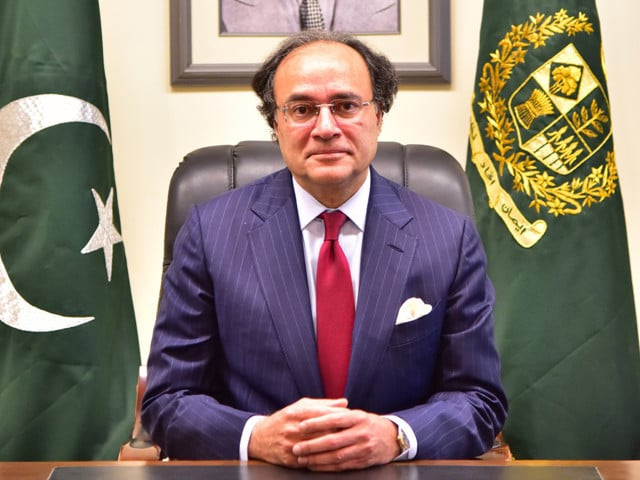New finance minister appointed
Experienced banker brought in as IMF mission to review on March 14

The Pakistan Muslim League-Nawaz (PML-N) government appointed Muhammad Aurangzeb, a career banker, as the Federal Finance Minister on Monday, giving him preference over its old economic guard and entrusting him with the responsibility of steering the economic ship out of stormy waters.
Aurangzeb took the oath of office on the day the International Monetary Fund decided to dispatch a mission to Pakistan. A senior finance ministry official told The Express Tribune that the Pakistan-IMF talks are beginning from March 14th –Thursday.
Securing an immediate new bailout package from the IMF will be the topmost priority of the new finance minister.
The government has assigned Aurangzeb the portfolio of the finance ministry, with the additional responsibility of the Revenue Division. This suggests that another minister will eventually take over this portfolio. Similarly, Ahad Cheema has been tasked with the portfolio of the Economic Affairs Division.
The IMF mission is set to reach Pakistan in the next 48 hours for the completion of the last review of the current programme and to begin negotiations for the new deal, said the senior finance ministry official.
Prime Minister Shehbaz Sharif has placed a bet on Muhammad Aurangzeb to lead his economic team. Aurangzeb’s hands will be strengthened by bringing in more people in the core economic team. Sharif plans to run the finance ministry’s affairs through a consultative process.
After Aurangzeb, the role of the Finance Secretary Imdad Ullah Bosal will be most critical. Bosal is considered a close confidante of the PM and has good relations with all stakeholders. Bosal has also been credited for the smooth completion of the current IMF programme.
Aurangzeb’s appointment brings an end to the formal role of former finance minister Ishaq Dar in Pakistan’s economic affairs, which began in 1998. Dar remained the finance minister four times, but Sharif has taken a different route to uncharted territory.
Aurangzeb tendered his resignation as President and CEO of Habib Bank Limited (HBL) on Monday, following his appointment as a federal minister. He was president of HBL for six years.
Aurangzeb is a former Citi banker and has also served in JP Morgan’s Global Corporate Bank based in Singapore and at ABN AMRO in Amsterdam. Aurangzeb, who renounced his Dutch nationality and was granted a Pakistani nationality on Monday evening, received his BS and MBA degrees from The Wharton School, University of Pennsylvania. Aurangzeb had previously renounced his Pakistani nationality in favour of the Dutch nationality.
By bringing in an outsider as finance minister, the PML-N has lost its claim on having an experienced in-house economic team. Dar’s departure from the financial front marks the beginning of a new era for PML-N and Aurangzeb too.
Sources said that the finance ministry was hopeful for the timely completion of the last programme review carrying the bonanza of over $1.1 billion loan tranche under the current programme expiring next month. Unlike in the past, the duration of the upcoming visit might be shorter this time. Pakistan has already met the conditions for the second review programme. The majority of the talks are expected to focus on the new bailout programme, which will be linked with the next budget, said the finance ministry officials.
The main conditions related to the external sector and budget have been met by Pakistan, including the primary budget target. As against the condition to have a primary deficit of Rs1.42 trillion, the government has shown a surplus of Rs1.8 trillion. Last time, however, the government missed the primary budget condition of the IMF.
Against the condition of spending Rs905 billion on health and education by all the governments, Pakistan has spent over Rs1 trillion in six months. The government has claimed that it has restricted the increase in the power sector circular debt to Rs378 billion in six months as against the maximum requirement of Rs385 billion.
The FBR has also met its conditions related to net taxes collected during the first half and Rs43 billion additions in the tax refunds.
However, the government could not meet the condition to make the Central Monitoring Unit in the Ministry of Finance operational by end November. This, however, does not have any negative impact on the overall target.
The central bank has also met its conditions related to the Net International Reserves and foreign currency swap.
The real test will be the next programme, and the new finance minister is keen to kick-start negotiations during the upcoming review talks, said sources. Pakistan has momentous external financing requirements for the next fiscal year, but its quota in the IMF limits the size of the financing to around $6 billion. The exact financing requirements and the IMF loan size will be determined during the review talks.
Last week, the IMF spokesperson said that the fund’s aim is to support the implementation of strong policies to deepen financial stability, address long-standing economic and underlying balance of payments challenges, and restore sustained and inclusive growth for the benefit of all Pakistani citizens.
The spokesperson further elaborated that in order to achieve these objectives there is a need for Pakistan to ensure stronger public finances, through high-quality revenue measures to broaden the tax base while scaling up the support for the most vulnerable.
The IMF is also pushing Pakistan to increase the tax burden of the salaried and the business individuals again by reducing the number of tax slabs –a move that would be highly counterproductive and could create unease among the salaried persons.



















COMMENTS
Comments are moderated and generally will be posted if they are on-topic and not abusive.
For more information, please see our Comments FAQ